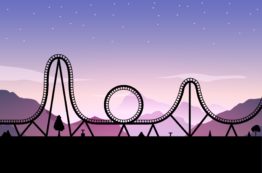
In the months after my mom, and then, later, Jackie, died, I would catch myself feeling, basically, nothing. It worried me. How could nothingness feel so awful? What kind of a raw deal is that? In grief, you’re either distraught or, if you’re not distraught, you’re feeling guilty that you’re not feeling tormented.
Grief counselor Ajita Robinson calls the numbing aspect “a natural and normal part” of grief. It happens frequently in the immediate aftermath of loss. She says that it’s “adaptive,” in that it allows you to function and get through your daily routine, especially if you’re a caregiver and you have to plan a funeral or take care of a child, or both. It’s necessary, but it also shouldn’t cause you to dissociate completely from experiencing grief because it just “kicks the can down the road.” The emotions don’t go away simply because you ignore them.
The numbness can make you feel like there is something deeply wrong with you because you are not doubled over sobbing every second of the day. My dad is no psychologist (he sells steel coils), but he is basically an expert on grief at this point. His theory is that we temporarily go numb to survive the pain. It helps us function for a while before the next wave slams us back. I also think that after experiencing such deeply felt, traumatic emotions, everyday existence tends to be mistaken for numbness. You’re spent, cried out, wrung dry. A baseline, whatever your baseline is, can feel like you’re flatlining, when really you’re just at your baseline. I’ve learned that the experience of feeling guilty about feeling nothing doesn’t seem to last long, so don’t worry. Another session of gut-wrenching tears is probably right around the corner!
Numbness or detachment can also be a sign of prolonged grief, which is a state of heightened mourning that can actually be harmful. It can stop you from getting back into life, and doing things like going to work or seeing friends. Katherine Shear, head of Columbia’s Center for Prolonged Grief, says, “Prolonged grief disorder means there is an initial, all-encompassing kind of grief. We like to say that grief emerges naturally and finds a place in your life; it doesn’t disappear. Prolonged grief is when it just stays in a domineering role in your life and it interferes with your ability to move forward in a way that’s meaningful.”
Periods of what might feel like emotional numbness, though, can be “a very natural coping mechanism.” Shear says some troubling signs are when people feel disconnected from work, friends, or things that used to bring them joy. They don’t feel okay moving forward or doing positive things for themselves, even after months or years. Prolonged Grief Disorder was added to the DSM-5 (Diagnostic and Statistical Manual of Mental Disorders, fifth edition) in 2022, and it caused some controversy, mainly because some people felt it was pathologizing grief. If it helps someone who is truly suffering, and they can get their insurance to cover treatment or medications, though, I’m all for it.
When Jackie died, I spent the first few weeks doing my share of weeping, gasping for breath, and painfully emoting everywhere I went. I tried to put on a smile for my son, but when I spoke to friends I could hear my voice shake. I felt weak, hollowed out. The barrier between me holding it together and me falling apart was about as precarious as a Victorian teacup with an anvil hanging overhead. But then, after a month or so, something strange happened. The breakdowns stopped and the anvil disappeared. I went on autopilot.
It’s not as if I forgot. Jackie was on my mind every day. Her photos surrounded me. I conjured her voice in my mind at will, just because. Still, it all felt unreal, as it had that night on the plane when I found out she was gone. Amy’s text saying I can’t believe this is real came to define my everyday existence. I also started to worry about the numbness, or about the fact that I wasn’t in turmoil every moment. I could go to restaurants or laugh at a movie. I could function, and this entry into “normal” life seemed to happen so much more quickly this time around, whereas with my mom it took about two years. Keep in mind, “normal” is all relative. Basically, I started to wonder why those early weeks of feeling distraught about my sister seemed to disappear so quickly. It didn’t seem right. In other words, What Was Wrong With Me?
We found out that Jackie passed away on March 1. Her birthday was coming up on September 13, and, for months, from about April to September, I had been coasting. Sad, of course, but coasting. I had been through this before, though, so as her birthday approached, I braced for impact. I knew that Mother’s Day and Thanksgiving and Halloween, which was my mom’s birthday, had been tough, so I thought that September 13 might possibly obliterate the numbness and mercifully bring me back to the land of the disconsolate.
The morning of Jackie’s birthday, I didn’t wake up sobbing. I took Cole to school, and then drove to my appointment with an allergist. As a kid, I’d done the allergy testing where they prick your skin and drop different concoctions into the slit (probably not the correct medical explanation but bear with me), to see if you’re allergic to ragweed or Pampas grass. Lucky me, I was allergic to pretty much anything that bloomed or grew in nature. Now here I was as an adult, back at the allergist to find out why I’d spent the summer sneezing and coughing and drowning my eyes in soothing drops. There is a thing in Texas called “cedar fever,” and many of us live in fear of it, in case you’re unfamiliar with how brutal allergies can be in this state. What I’m saying is, I itched.
It was a gray, cloudy morning. The kind of weather that would probably make me feel melancholy even if I’d just won a Super Lotto. I thought of Jackie more than usual. I thought of her intentionally, with purpose. This was the first birthday in forty years that I couldn’t reach out to her. Even during the years when she was drinking and in horrible shape, years we weren’t talking much because it’s sometimes too painful to try to force closeness with an alcoholic when they’re just not capable and it hurts too much, I would always at least send a text. Whether she texted back depended on her state at that moment. It didn’t matter. I loved my sister, and no matter how enraged or frustrated I would become, I always wished her a happy birthday. And now I just couldn’t, the same way I couldn’t text my mom about the red carpet. As I drove to the allergist, that dawning reality that she was not there to reply or not reply to my text brought every emotion to the surface, every stored-up ounce of pain. The numbness was indeed obliterated, and the tears broke through. As soon as I pulled into a parking spot at the clinic, I called my dad.
“Dad, I’m sad about Jackie.”
“I know. It just hits when you least expect it,” he said, yet again.
This time, though, I did expect it. It was her birthday, after all. I guess that after so many months of coasting, I just didn’t know it would hit this hard. How could I walk into a crowded waiting room and check in for my pinprick appointment when I could barely speak through my sobs? Even with a mask on, people would see that something was not right with me. As I sat in that car and stared at people coming and going through the double doors to the clinic, there was nothing unreal or surreal or hard to believe about Jackie’s death. This was as real as you could get. This was hot tears, disgusting snot, red-blotches-on-your-face real. This was knowing someone is gone, feeling it to your core, understanding that there is nothing you can do to bring them back. This was the depths of grief. This was hell.
“It just hurts so much, Dad.”
“I know honey. It happens to all of us.”
In a way, I think I was almost relieved to have these feelings again, and to know that numbness was just me living in the world. It didn’t mean I didn’t love her, or miss her.
It didn’t mean there was something wrong with me, like my emotions had malfunctioned or that I was a coldhearted automaton. Despite the pain, or more likely because of it, I also felt how much I loved my sister in that moment. That feeling was just as real as the tears.
Excerpted from So Sorry For Your Loss: How I Learned to Live with Grief, and Other Grave Concerns © 2023 by Dina Gachman, published by Union Square & Co.









